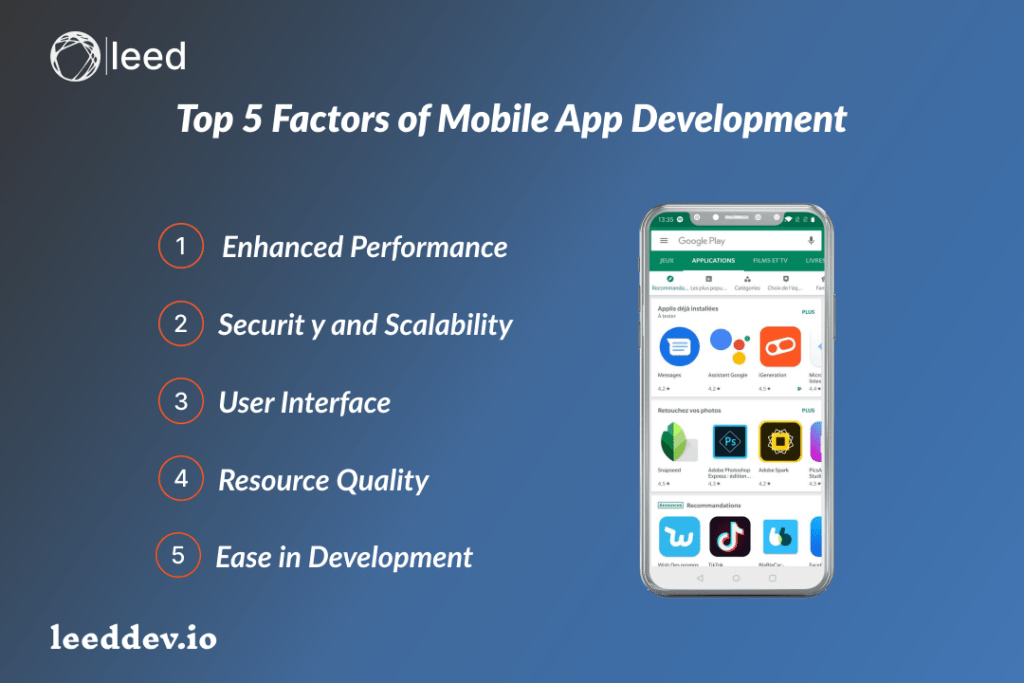Let’s face it the app stores are flooded. With over 3.5 million apps on Google Play and 2 million+ on App Store standing out is harder than ever. You might have a brilliant app idea but unless it’s built right, tested well and delivers value it’ll get buried in the noise.
So what separates top performing apps from the forgotten ones? It all starts with understanding the core factors that drive success in mobile app development.
What is Mobile App Development?
Mobile app development is the process of creating software applications that run on mobile devices like smartphones or tablets. It involves designing, building, testing, and deploying apps for platforms like iOS, Android, or both.
Mobile apps can be:
- Native (built specifically for one platform)
- Hybrid (built with web technologies and run inside a native container)
- Or Cross-platform (using frameworks like Flutter or React Native)
Mobile App Development Process
Building a successful mobile app involves series of well defined stages. Here’s a breakdown of each phase:
Ideation & Research
Every great app starts with strong idea. This phase involves defining the purpose of app, understanding target users, analyzing competitors and validating the concept through market research
UI/UX Design
Once the idea is solid design takes center stage. This step focuses on creating intuitive wireframes, building user friendly interfaces and ensuring engaging user experience across devices
App Development
Here’s where the actual building begins. Developers choose appropriate tech stack and begin coding both frontend and backend components. Integration with APIs, third party services & databases is also handled during this stage
Testing
Testing ensures app is functional, secure and bug free. It includes unit testing, usability testing, performance testing and ensuring the app runs smoothly across different devices, screen sizes & OS versions
Deployment
After thorough testing app is submitted to App Store and Google Play Store. This step also involves compliance with platform specific guidelines and setting up analytics and crash reporting tools
Maintenance & Updates
Post launch the journey doesn’t end. Regular maintenance, security patches, user feedback analysis and new feature rollouts keep app relevant, functional and competitive in the market
Key Factors for Successful Mobile App Development
Now let’s dive into what really makes a mobile app successful!
Clear Purpose and Value Proposition³
The best apps solve real problems. Whether it’s convenience, entertainment or saving time your app must deliver clear value to users
Flawless User Experience
Good UX is smooth, intuitive & fast. Poor navigation, cluttered interfaces or long load times are the fastest ways to lose users
Performance and Speed
Nobody likes a laggy app. Speed, responsiveness & smooth interactions are essential especially when users have high expectations
Platform Compatibility
Make sure app works perfectly across multiple devices, screen sizes & operating systems like iOS, Android, tablets etc.
Security & Data Protection
With cyber threats on rise secure data handling, encryption & compliance with privacy laws are non negotiable. Make sure the app has advanced security features
Scalability
As your user base grows your app must scale without crashing or slowing down. Scalable architecture and cloud integration help here
Offline Functionality
Allowing users to access key features even without internet connection can greatly improve engagement & retention
Updates & User Feedback
Top apps evolve. Listen to users, fix bugs & roll out new features. Apps that don’t meet user expectations quickly loose users
Marketing & ASO
Even best app needs visibility. Optimize app store listing with important keywords, engaging visuals & strong reviews to improve downloads
Summarizing It!
Mobile app development is more than writing code it’s about crafting an experience. From a solid idea to post launch support each phase is critical. Most successful apps are those that focus on solving real problems, delivering a great user experience & constantly improving through market trends.
Want to develop an app that not only works but wins? Let Leed Software Development help. We specialize in custom mobile app development ensuring your idea is brought to life with the right strategy, technology and team. Whether you’re building for Android, iOS or both we’ll guide you through the entire journey cost efficiently and successfully. Let’s talk about your app idea today!
FAQs
How long does it take to develop a mobile app?
Development time depends on the complexity of the app. A basic app can take 2–3 months, while a more advanced app may take 6+ months including design, development, and testing.
How much does it cost to develop a mobile app?
The cost varies based on features, platforms (iOS, Android, or both), and design complexity. At Leed Software Development, we offer flexible pricing models tailored to your budget and requirements.
Should I build my app for Android or iOS first?
It depends on your target audience. If your users are mostly on one platform, start there. Otherwise, a cross-platform approach may be more efficient. We help you decide the best strategy.
How do I protect my app idea?
We sign NDAs (Non-Disclosure Agreements) to keep your idea confidential. Plus, we follow strict data protection protocols throughout the development process.
Will you help with app store submission and approval?
Absolutely. We handle the full deployment process, including meeting Apple and Google guidelines, submitting your app, and setting up analytics and crash reporting tools.
What kind of post-launch support do you offer?
We offer ongoing support for bug fixes, performance optimization, security updates, and feature enhancements. We’re your tech partner long after launch.




